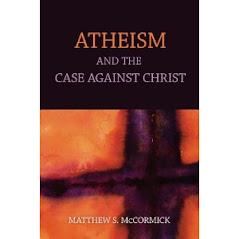Monday, January 31, 2011
Werewolves, Evil Demon Possessions, Reincarnation, and God
Wednesday, January 19, 2011
Going Nuclear

Stephen Law has nicely put his finger on a common philosophical objection and mistake that gets lodged against atheists here: http://stephenlaw.blogspot.com/2010/09/chapter-of-book-for-comments.html
Saturday, January 15, 2011
Are We Proving the Negative Yet? Lecture in Berkeley.
I'll be speaking to the East Bay Atheists in Berkeley tomorrow (January 16) at 2:00 in the Berkeley Main Library, 3rd Floor Meeting Room, 2090 Kittredge St.
Here's the write up for the East Bay Atheists about the lecture.
I'll be giving an updated version of the "Are We Proving the Negative Yet?" lecture. Here are the slides.
Please come if you're in the area.
Wednesday, January 12, 2011
More Disastrous Effects of Adding God Into Our Moral Decisions
Being moral is hard. Trying to sort out and prioritize the most ethically salient features of a complicated decision and then make a choice is filled with ambiguity. And when the stakes are high, the complexities and ambiguities amplify our apprehension. So it's no wonder that so many people derive comfort from the idea that God can see through the fog and provide us with clear and certain moral answers. The problem, of course, is that he doesn't. Believers are notorious for cherry picking the passages from the Bible, edicts from the Pope, or other divine sanctions that suit them while ignoring the ones that don't give them the answers they want. Even worse, we broadcast more of our own moral sentiments onto God than we do other people, in part because what God wants is so murky.
See http://atheismblog.blogspot.com/2010/06/illusion-of-moral-guidance-from-god.html.
Also see: "Believers' estimates of God's beliefs are more egocentric than estimates of other people's beliefs." Epley N, Converse BA, DElbosc A, Montelone GA, and Cacioppa JT. http://www.ncbi.nlm.nih.gov/pubmed/19955414
Other research has also shown that we are prone to change our minds about moral matters when we are forced to consider the opposing viewpoint or alternatives, but we frequently conceal that shift in attitude from ourselves and insist that the view we changed to was the one we had all along. Combine that tendency with our predisposition to attribute more of our own views to God, and you create idiosyncratic, and capricious decision makers who invoke God as their authority.
It turns out that that combination is just as scary as it sounds. Here's a recent study about the effects of scriptural violence on aggression by Brad J. Bushman, Robert D. Ridge, Enny Das, Colin W. Key, and Gregory L. Busath.
"When God Sanctions Killing: The Effects of Scriptural Violence on Aggression," Psychological Science, Vol. 18, Number 3. http://www.psychologicalscience.org/media/releases/2007/bushman.cfm
ABSTRACT—Violent people often claim that God sanctions their actions. In two studies, participants read a violent passage said to come from either the Bible or an ancient scroll. For half the participants, the passage said that God sanctioned the violence. Next, participants competed with an ostensible partner on a task in which the winner could blast the loser with loud noise through headphones (the aggression measure). Study 1 involved Brigham Young University students; 99% believed in God and in the Bible. Study 2 involved Vrije Universiteit–Amsterdam students; 50% believed in God, and 27% believed in the Bible. In Study 1, aggression increased when the passage was from the Bible or mentioned God. In Study 2, aggression increased when the passage mentioned God, especially among participants who believed in God and in the Bible. These results suggest that scriptural violence sanctioned by God can increase aggression, especially in believers.
So now consider the combined point of all three threads of research. 1) We project more of our own views onto God than others who we know more about. 2) We can be easily induced to change our minds about moral matters and then we hide the shift from ourselves. And 3) when people think that God sanctions violence, they become more aggressive themselves. That is, adding God to the considerations in moral matters would appear to make things worse because we don't actually know what God wants, but we endow him with our own views, but when the un-moored views inevitably shift around, God provides us with a sort of carte blanche endorsement of whatever they morph into. And adding God into the story exacerbates our aggressive and violent proclivities. And you thought violent video games were bad.
Tuesday, January 11, 2011
The Evolution of Hating Atheists
Saturday, January 1, 2011
The Divine Attributes: The State of the Discussion
Readers here will know that I do not hold a sanguine view about the prospects for a description of God that 1) outlines being who is worthy of a suitably religious attitude, 2) conforms, even in the roughest way, with the historical accounts that have been given of God by Christianity and other religions, 3) gives a list of properties that themselves are each coherently formed and understood, 4) gives a list of properties that are consistent with each other, and 5) conforms, even in the roughest way, with what we now know about the physical universe through physics, cosmology and biology. That is to say that we don't have, nor is there forthcoming, any account of God that makes sense along a number of vectors. Explaining and defending each of these theses is, of course, a complicated matter, but I have been doing it across a multitude of posts, lectures, and published works.
Ex-Apologist (whose blog I highly recommend) has brought our attention to a recent article by Nicholas Everitt called The Divine Attributes. Everitt has written a well received book called The Non-Existence of God that I also recommend for those interested in a fairly straight forward analysis, using standard analytical philosophical techniques, of the arguments for and against the existence of God. Here's Everitt's abstract:
"Focusing on God’s essential attributes of omnipotence, omniscience, being eternal and omnipresent, being a creator and sustainer, and being a person, I examine how far recent discussion has been able to provide for each of these divine attributes a consistent interpretation. I also consider briefly whether the attributes are compatible with each other."
It looks like Everitt's overview of the recent literature, perhaps coupled with my overview of "Deductive Atheology" in the Atheism entry of the Internet Encyclopedia of Philosophy would give one a good comprehensive picture of where philosophy of religion is today.
Then, in his summary, Everitt makes this comment:
"The divine attributes thus present a number of intriguing philosophical problems: problems with finding self-consistent accounts of each of the attributes, with ensuring that the accounts form a self-consistent set, and with reconciling the attributes with other seeming facts of human experience (divine omniscience and human freedom, divine goodness and widespread underserved suffering, etc). Is it possible to formulate a version of theism which can simply sidestep these problems?
Suppose we start with the bare thought of God as a being who is worthy of worship. Suppose also that we think that to be worthy of worship, a being must have a right to our allegiance, and be worthy of our love, admiration, and veneration. It is surely some such concept of worship-worthiness which has led most of those who have worshiped supernatural beings to do so. Perhaps such a god needs to be powerful – but why omnipotent? Perhaps knowledgeable – but why omniscient? Perhaps good – but why perfectly
so? Perhaps long-lasting – but why eternal? It is not as if there is any overwhelming Biblical warrant for the traditional attributions.This way of thinking of divinity has the merit, from the point of view of an impartial
uncommitted inquirer, of sidestepping the philosophical problems which the traditional attributes bring, while yet retaining the idea of worship-worthy supernatural beings. But it is not a route which has proved appealing to many theists in their reflections on the nature of the being who is the object of their worship."
My off the cuff reaction to this (I haven't had the time to give the whole article a careful read) is that it is surely possible to give a coherent description of a being possessing some degree of power, knowledge, and goodness (we are such beings, afterall), but the resulting account will suffer from new problems:
1) Do we have any real arguments or evidence to think this sort of scaled down being exists? The goal, afterall, is not to just give a coherent description of God at all costs. The goal is form a reasonable set of beliefs about what's true, what sorts of things are real, and what sort of position we have in the universe historically, metaphysically, and morally. Unless there are some substantial reasons forthcoming to think that such a being is not merely possible but real, the long list of utter failures by the smartest humans in history to render believing in God reasonable sets the prima facie burden of proof very high. A perpetual motion machine, or gnomes may be possible, but it is fair for us to set the bar very high before we accept them as actual.
2) I think the prospects for such a scaled down account of God giving us a being that is suitably "worship-worthy" are very dim. In 1948, J.M. Findlay gave us a very persuasive argument in "Can God's Existence be Disproved?" that no thing short of a full blown omnipotent, omniscient, and omnibenevolent being will be worthy of the title "God," and the failures of the ontological argument show that there is no such being. (I will have to read up in Everitt to get clear on what he thinks about a Findlay style approach.) The point: If there is no omnipotent, omniscient, and omnibenevolent being, then there is no being that should be called "God." And other lesser notions of semi-powerful, semi-knowledgeable, and semi-good beings are philosophically and religiously irrelevant and uninteresting.
3) It is the practice among careful, respectful, and thoughtful analytic philosophers who find some fatal flaw in an argument for the existence of God to leave every possible avenue of redress open to the theist to save some face and salvage some new, re-engineered account of God from the wreckage. Not being as careful, respectful, and maybe thoughtful as they are, I am inclined to draw sweeping conclusions from the repeated failures of these exercises in logical and philosophical gymnastics. See Are We Proving the Negative Yet? and Perpetual Motion Machines and an Argument Against Agnosticism for a couple of examples of my rash, overgeneralizing. Many billions of people believe. Many billions more have believed in history. The widespread consensus among our best experts on the topic, philosophers of religion, is that to date, none of our best efforts to construct a justification for believing have succeeded. Even worse, as Everitt's summary of the discussion of divine attributes shows, we don't even have a clear, coherent, or non-controversial account of what properties God would have, even if he was real. And that's despite devoting centuries of our hardest thinking to the project.
It's time for sensible people to see the larger implications of those failures. We've done our due diligence. The failure of a couple of philosophical inquiries into arguments for X to produce viable grounds for believing X should just be understood as limited failures of those arguments. The failures of ALL of our attempts, by millions of people over the course of thousands of years to produce acceptable grounds for believing X suggests that something else is at work here than just a failure of creativity or limited resources. (See The Santa Principle).








